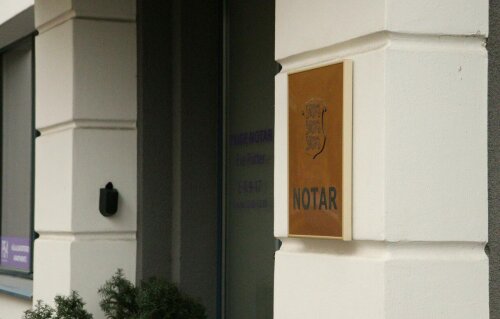Best Family Lawyers in Paide
Share your needs with us, get contacted by law firms.
Free. Takes 2 min.
Free Guide to Hiring a Family Lawyer
List of the best lawyers in Paide, Estonia
About Family Law in Paide, Estonia
Family law in Paide, Estonia, is governed by national Estonian legislation, including the Family Law Act, but local courts and social departments play a significant role in resolving family matters. The law covers various topics such as marriage, divorce, child custody, adoption, maintenance (alimony), and division of property. Family law is designed to protect the rights and interests of family members, ensure the well-being of children, and facilitate fair solutions in case of disagreements or breakdowns in family relationships. Paide, as the administrative center of Järva County, has local authorities that can provide support and resources for families navigating legal issues.
Why You May Need a Lawyer
Family law situations can be complex, emotionally challenging, and may significantly affect your life and the lives of your loved ones. There are several common scenarios where legal assistance is essential, including:
- Divorce applications or contested divorce proceedings
- Child custody disputes, including international cases where one parent lives abroad
- Child or spousal maintenance (alimony) negotiations and enforcement
- Property division after separation or divorce
- Adoption processes, both domestic and international
- Family violence or protection orders
- Establishing or disputing paternity
- Drafting prenuptial or cohabitation agreements
Local Laws Overview
Estonian family law, which applies in Paide, is primarily regulated by the Family Law Act (Perekonnaseadus). Some key local aspects relevant for residents include:
- Marriage and Divorce: The law sets minimum ages for marriage, stipulates requirements for registration, and regulates divorce by mutual consent or through court proceedings in case of dispute.
- Child Custody and Support: Both parents generally share custody, but the court can grant sole custody based on the child's best interests. Child support amounts are guided by national rules but can be adjusted locally based on individual circumstances.
- Division of Property: Estonia applies the principle of community property for property acquired during marriage, which is divided equally unless otherwise agreed.
- Adoption: Adoption rules are strict, and prospective parents must undergo an assessment process. The child's well-being and consent (if old enough) are primary factors.
- Domestic Violence: Protection measures and restraining orders are available. Victims can seek help from social services, police, or the courts.
- Local Authorities: Paide's local government and social services may assist with mediation, counseling, and support services related to family issues.
Frequently Asked Questions
What are the requirements for getting married in Paide, Estonia?
To marry in Paide, both parties must be at least 18 years old, not closely related, and not already married. The marriage must be registered at the local vital statistics office (Perekonnaseisuamet).
How does divorce work in Paide?
Divorce can be registered by mutual agreement at a notary or via the court if there is disagreement about matters such as custody, maintenance, or property division. You will need to provide reasons and resolve issues related to children and property before the divorce is finalized.
Who decides child custody in Paide?
Ideally, parents agree on custody arrangements. If not, the court decides based on the child's best interests, considering factors like the child's relationship with each parent, living environment, and the ability of each parent to care for the child.
How is child support calculated?
Child support is based on the parent's income and the needs of the child, following the country's guidelines. The minimum rate is set by national law but can be increased by court order if warranted.
Can I get protection from domestic violence?
Yes, you can apply for a restraining order or protection order through the local court. In urgent cases, police and social services in Paide can provide assistance and immediate measures to ensure your safety.
What is the process for adoption?
Adoption in Estonia is overseen by the court. Prospective parents undergo social and psychological evaluation, and the child's interests are the main consideration. Local social services can guide you through the application process.
Do I need a lawyer for a prenuptial agreement?
While not mandatory, it is advisable to consult a lawyer to ensure that the agreement is legally valid, fair, and considers your specific circumstances. The agreement must be notarized.
How does property division work after divorce?
Property acquired during marriage is usually divided equally unless you have a prenuptial or cohabitation agreement stating otherwise. The court can make adjustments based on fairness and the interests of any children.
Can grandparents apply for custody or contact rights?
Grandparents and other relatives can apply for contact with a child if it is in the child’s best interests. The court will assess the family situation and the child's welfare before making a decision.
Are there mediation services available for family disputes?
Yes, mediation is widely encouraged in Estonia, including Paide. Local social departments and private mediators can assist in resolving disputes amicably, which may be required before court proceedings in certain cases.
Additional Resources
If you need more information or assistance related to family law in Paide, the following resources may be helpful:
- Paide City Government Social Department - offers counseling, support, and mediation services for family and child welfare issues.
- Estonian Ministry of Justice - provides information on family law and court procedures.
- Local notaries - assist with legal documentation for marriage, divorce, and agreements.
- Estonian Child Protection Services (Lastekaitse) - support and advocacy for children and families.
- Legal Aid Estonia - government-funded free or low-cost legal aid for people who meet the criteria.
- Local law firms and family law specialists in Paide.
Next Steps
If you are facing a family law issue in Paide, Estonia, take the following actions:
- Gather all relevant documents such as marriage or birth certificates, contracts, and correspondence.
- Identify the main issues you need help with, such as divorce, custody, or property division.
- Contact local authorities or social services for initial guidance and support.
- Consult a qualified family law lawyer for an initial assessment of your case and to discuss your rights and options.
- Consider mediation services before proceeding to court, especially if children are involved.
- Follow legal advice and keep records of all interactions and agreements.
- Prepare for possible court or notary procedures, ensuring all documents are in order.
Lawzana helps you find the best lawyers and law firms in Paide through a curated and pre-screened list of qualified legal professionals. Our platform offers rankings and detailed profiles of attorneys and law firms, allowing you to compare based on practice areas, including Family, experience, and client feedback.
Each profile includes a description of the firm's areas of practice, client reviews, team members and partners, year of establishment, spoken languages, office locations, contact information, social media presence, and any published articles or resources. Most firms on our platform speak English and are experienced in both local and international legal matters.
Get a quote from top-rated law firms in Paide, Estonia — quickly, securely, and without unnecessary hassle.
Disclaimer:
The information provided on this page is for general informational purposes only and does not constitute legal advice. While we strive to ensure the accuracy and relevance of the content, legal information may change over time, and interpretations of the law can vary. You should always consult with a qualified legal professional for advice specific to your situation.
We disclaim all liability for actions taken or not taken based on the content of this page. If you believe any information is incorrect or outdated, please contact us, and we will review and update it where appropriate.
Browse family law firms by service in Paide, Estonia
Paide, Estonia Attorneys in related practice areas.









